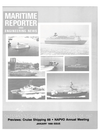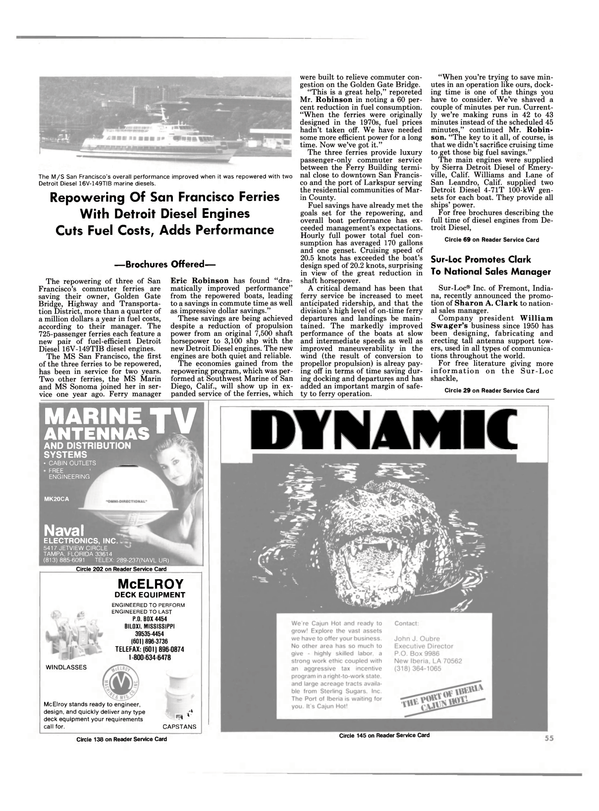
Repowering Of San Francisco Ferries With Detroit Diesel Engines Cuts Fuel Costs, Adds Performance
—Brochures Offered— The repowering of three of San Francisco's commuter ferries are saving their owner, Golden Gate Bridge, Highway and Transportation District, more than a quarter of a million dollars a year in fuel costs, according to their manager. The 725-passenger ferries each feature a new pair of fuel-efficient Detroit Diesel 16V-149TIB diesel engines.
The MS San Francisco, the first of the three ferries to be repowered, has been in service for two years.
Two other ferries, the MS Marin and MS Sonoma joined her in service one year ago. Ferry manager Eric Robinson has found "dramatically improved performance" from the repowered boats, leading to a savings in commute time as well as impressive dollar savings." These savings are being achieved despite a reduction of propulsion power from an original 7,500 shaft horsepower to 3,100 shp with the new Detroit Diesel engines. The new engines are both quiet and reliable.
The economies gained from the repowering program, which was performed at Southwest Marine of San Diego, Calif., will show up in expanded service of the ferries, which were built to relieve commuter congestion on the Golden Gate Bridge.
"This is a great help," reporeted Mr. Robinson in noting a 60 percent reduction in fuel consumption.
"When the ferries were originally designed in the 1970s, fuel prices hadn't taken off. We have needed some more efficient power for a long time. Now we've got it." The three ferries provide luxury passenger-only commuter service between the Ferry Building terminal close to downtown San Francisco and the port of Larkspur serving the residential communities of Marin County.
Fuel savings have already met the goals set for the repowering, and overall boat performance has exceeded management's expectations.
Hourly full power total fuel consumption has averaged 170 gallons and one genset. Cruising speed of 20.5 knots has exceeded the boat's design sped of 20.2 knots, surprising in view of the great reduction in shaft horsepower.
A critical demand has been that ferry service be increased to meet anticipated ridership, and that the division's high level of on-time ferry departures and landings be maintained.
The markedly improved performance of the boats at slow and intermediate speeds as well as improved maneuverability in the wind (the result of conversion to propellor propulsion) is alreay paying off in terms of time saving during docking and departures and has added an important margin of safety to ferry operation.
"When you're trying to save minutes in an operation like ours, docking time is one of the things you have to consider. We've shaved a couple of minutes per run. Currently we're making runs in 42 to 43 minutes instead of the scheduled 45 minutes," continued Mr. Robinson.
"The key to it all, of course, is that we didn't sacrifice cruising time to get those big fuel savings." The main engines were supplied by Sierra Detroit Diesel of Emeryville, Calif. Williams and Lane of San Leandro, Calif, supplied two Detroit Diesel 4-71T 100-kW gensets for each boat. They provide all ships' power.
For free brochures describing the full time of diesel engines from Detroit Diesel, Circle 69 on Reader Service Card
Read Repowering Of San Francisco Ferries With Detroit Diesel Engines Cuts Fuel Costs, Adds Performance in Pdf, Flash or Html5 edition of January 1988 Maritime Reporter
Other stories from January 1988 issue
Content
- Parker Hannifin To Acquire Gull Inc. page: 5
- Marine Machinery Association Reports On Defense Mobilization Base Forum page: 6
- ITW Philadelphia Resins Offers Bulletin On Repair Compounds And Adhesives page: 7
- Free Literature Package On Port Equipment Offered By Westmont Industries page: 8
- Cruise Ship Construction Boom page: 8
- CRUISE SHIPPING 88 page: 10
- Dampa Awarded Contract To Furnish Joiner Systems page: 11
- Commander Bearings Offer Excellent Performance In Harsh Environments page: 12
- Transformation Of S.S. Monterey Into Luxury Cruise Liner Underway At Wartsila-Helsinki page: 12
- Krupp MaK Offers 28-Page Brochure On Dicare Engine Diagnosis System page: 12
- A. Edward Owen Named President And CEO, ZF Of North America page: 13
- Edger Named President Of Jered Brown Brothers page: 14
- Saab Offers N ew User Friendly System To Load And Discharge Tankers page: 14
- Free 46-Page Booklet Offered On xFlex' Electric Power Tools page: 15
- OUTSTANDING PASSENGER VESSELS OF 1987 page: 16
- OUTSTANDING WORKBOATS & MILITARY SHALLOW-DRAFT VESSELS OF 1987 page: 26
- 1988 NAPVO Annual Convention Washington, D.C., January 10-15 page: 36
- MMC Offers Free Literature On Improved xFlexi-Dip' Portable Electronic Tape page: 38
- PME Offers Eight-Page Brochure On Babbitt Bearing Repair Service page: 39
- Megasystems Introduces New Product—DOT / / PC page: 39
- The Repowering Of QE2— The Largest Diesel Power Station Afloat page: 40
- Parker Offers Literature On New General Purpose Packless, Bellows Valves page: 42
- ZF Of North America Introduces ZF-FPM IRM-350 Marine Gear page: 42
- S.P. Radio Introduces New Low-Cost, High-Quality Compact Radiotelephone page: 42
- Organizational Changes At Wagner Company page: 43
- Railway Drydocks Designed By Crandall Recently Completed And Now In Operation page: 44
- Knut Kloster Project To Build $800-Million Cruise Ship Close To Becoming Reality page: 45
- SPD Technologies Develops New Advanced Computerized Battery Monitoring System page: 45
- Literature Available On New IMO® Screw Pump page: 46
- Hitachi Zosen Delivers 48,000-Gross-Ton Car Carrier Overseas Joyce page: 50
- TTS Installs Wartsila Computer-Assisted Manufacturing System page: 51
- Furuno Introduces New Compact VHF Radiotelephone And LP-1000 Loran/Plotter page: 52
- Moss Point Acquisition By Trinity Will Consolidate Shipbuilding Functions, Improve Efficiency page: 52
- Parker Hannifin Offers Free Literature On Union Bonnet Valves page: 53
- Sea-Tex Introduces New Color Video Tract Plotter page: 54
- Repowering Of San Francisco Ferries With Detroit Diesel Engines Cuts Fuel Costs, Adds Performance page: 55
- Government To Charge Cruise Lines For Sanitary Inspections page: 56
- New Harris HF-SSB Radio Offers Operating Simplicity page: 56
- World's Largest Aluminum Crewboat Features Five Cummins Engines page: 57
- Enrollment Open For Outside Plant Telecom Corrosion Testing Course page: 57
- Miller Electric Offers The Legend AEAD-200LE Welding Generator page: 58
- Arneson Marine Relocates Eastern Regional Office To North Miami Beach, Fla. page: 59
- Schottel Rudderpropeller Systems Provide Excellent Maneuverability For New Class Of RO/RO Ferries page: 60
- Powerful Docking Tug Delivered By Gladding-Hearn Shipbuilding page: 63


